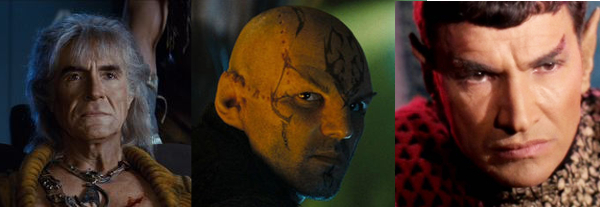I found this an interesting question, but one that is ultimately too broad. Of course redemption should be an option that is open for villains (differentiating here from the broader category of "antagonists"). But the determining factor must always be what is best for the story and makes the most sense for the characters.
Khan, for example, must be destroyed, simply because he must represent the consuming, destructive nature of vengeance and hatred. It would also make little dramatic sense for him to, at some point, say, "You know, Jim. Can I call you Jim? Jim, I've reconsidered. You didn't mean to ruin my life. I'm really sorry for killing all those innocent people. I'd like to use my superior intellect and genetically enhanced strength for good instead of evil. Where do I sign up for Starfleet Academy?"
He's Ahab. Ahab doesn't have a change of heart - not because we're making a broad statement that certain people cannot be redeemed, but because he must represent the self-destructive nature of obsession.
On the other hand, I used to review films directed at kids and teens and I was always disappointed by the trope that, since we can't kill the villain, we must thoroughly humiliate them. It somehow seemed more cruel that, instead of the villains' actions tragically leading to their own demise, our heroes laughed and smiled as the villains were electrocuted, drenched in muck, tortured, and reduced to whimpering masses in public view. I thought these films often missed clear opportunities to offer redemption to their villains.
And perhaps that's what's missing more than anything else - the offer. Heroes are so consumed with overcoming the villains that they rarely reach out a hand to offer them a way out. If the villain accepts, then our hero is lifted even higher in our estimation and illustrates grace and compassion as leading to the truest victory. If they refuse, the audience has the moral reassurance that "at least we tried" and is reminded that redemption is available.
The rejection of an offer of redemption also serves to show that the villain is committed to his or her chosen path, regardless of the consequences. Again returning to Star Trek, this is demonstrated in the final encounter between the Enterprise and Nero in the 2009 film, and more tragically in the TOS episode "Balance of Terror," which takes the approach of suggesting that our "villain" is no more evil than we are. (This calls to mind for me Derek Webb's song "My Enemies Are Men Like Me.") Sometimes the most powerful stories remind us of the humanity of even our most hated foe.
Still, in mythological tradition, there is often a need for characters to be icons and archetypes, which often necessitates certain fates, so that the ideals with which those characters are aligned may be clearly shown to lead to greater good, or to destruction. So, the upshot is that a good storyteller should be aware of all these tools and of the type of story he or she wishes to tell. All of the available options are valid and all can fall flat with misapplication. In the end, the hero of every story is good narrative structure.


 RSS Feed
RSS Feed
